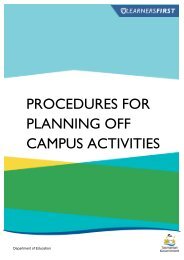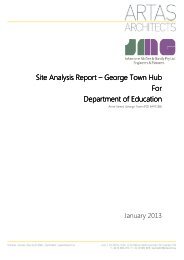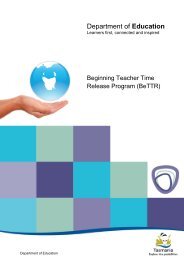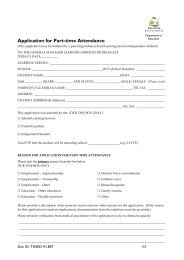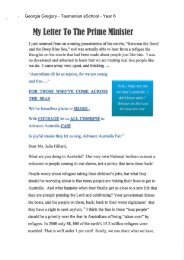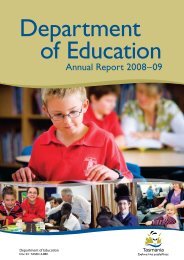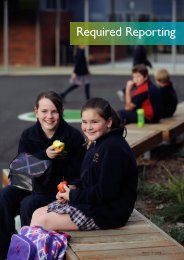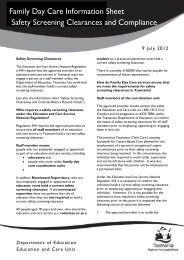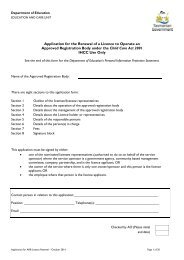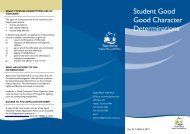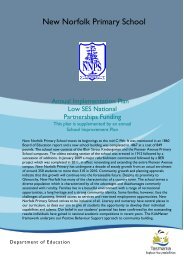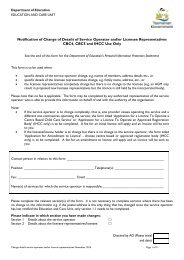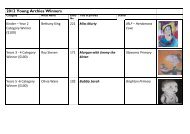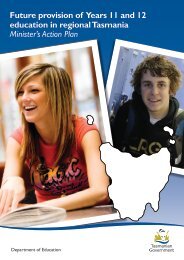Education
DoE Annual Report 2012-2013 - Department of Education
DoE Annual Report 2012-2013 - Department of Education
- No tags were found...
Create successful ePaper yourself
Turn your PDF publications into a flip-book with our unique Google optimized e-Paper software.
the implementation of high quality programs and effective<br />
practices that support learning from birth to Kindergarten.<br />
Belonging, Being, Becoming – The Early Years Learning<br />
Framework for Australia is the curriculum framework that<br />
guides the team’s practice and has been designed for use<br />
by early childhood teachers to work in partnership with<br />
families, children’s first and most influential educators.<br />
There is a strong focus and a specific emphasis on play<br />
based learning and recognition of the importance of<br />
communication and language including early literacy<br />
and numeracy, and social and emotional development.<br />
The team’s work assists the ongoing implementation and<br />
development of Launching into Learning, which supports<br />
families and young children in school communities.<br />
Support is also provided to child and family centres.<br />
The <strong>Education</strong> and Care Unit (ECU) regulates<br />
education and care (child care) in Tasmania. The unit, as the<br />
Tasmanian Regulatory Authority, is responsible for the<br />
implementation of the National Quality Framework for Early<br />
Childhood <strong>Education</strong> and Care, including the administration<br />
of the <strong>Education</strong> and Care Services National Law (Tasmania)<br />
2011. ECU also administers the Child Care Act 2001.<br />
The unit supports and monitors the development of<br />
high quality education and care programs and services in<br />
Tasmania, including administration of a nationally consistent<br />
assessment and rating process and the implementation<br />
of Belonging, Being and Becoming – The Early Years Learning<br />
Framework for Australia and My Time, Our Place – Framework<br />
for School Age Care in Australia.<br />
<strong>Education</strong>al Performance Services (EPS) monitors<br />
and measures student outcomes in the pre-compulsory<br />
and compulsory years of schooling including achievement<br />
against the national benchmarks established under the<br />
National Assessment Program – Literacy and Numeracy<br />
(NAPLAN). EPS also provides statewide support and<br />
advice for teacher assessment and reporting against the<br />
standards of the Tasmanian Curriculum and the Australian<br />
Curriculum as it is being progressively implemented by<br />
schools. EPS is directed towards Tasmanian compliance<br />
with national assessment program requirements and<br />
national reporting for the schooling sector to the end<br />
of Year 12. EPS has representation at a national level in<br />
a number of forums around Tasmania’s performance,<br />
public reporting and accountability requirements.<br />
EPS monitors and reports on the educational<br />
accountability information required for specific purpose<br />
programs and is also responsible for corporate reporting<br />
and facilitating the collection, storage and utilisation of<br />
student and school data. In addition to this, EPS develops<br />
and implements systems such as the Student Support<br />
System and the NAPLAN Toolkit designed to support<br />
classroom teachers and provide the capacity for statewide<br />
analysis of student data.<br />
The English as an Additional Language (EAL)<br />
Program focuses on improving educational opportunities<br />
and outcomes for newly arrived students by providing<br />
resources that develop English language competence and<br />
facilitate participation in mainstream educational activities.<br />
Proficiency in Standard Australian English is crucial to<br />
achieving successful learning outcomes in all areas of the<br />
curriculum. EAL Program support is delivered by EAL<br />
teachers and teacher assistants according to the needs of<br />
the students enrolled in each school.<br />
eLearning supports flexible provision across the<br />
department. In addition, the Flexible Learning Network<br />
provides a collaborative structure to deliver academic,<br />
general and vocational study options for senior secondary<br />
students. eLearning manages the online learning tools<br />
and collection of digital resources that support quality<br />
teaching and learning for the Australian Curriculum.<br />
This includes the deployment of a new Virtual Learning<br />
Environment across Tasmanian schools. eLearning manages<br />
the coordination and delivery of a variety of online<br />
courses and opportunities to students throughout<br />
Tasmania that complement local provision and provide<br />
access to educational experiences and opportunities that<br />
would otherwise be unavailable, e.g. programs for<br />
gifted/highly-able students and other core and<br />
extension courses such as languages.<br />
Learning Services (North, North-West and South)<br />
provide support for networks of schools through the<br />
services of a general manager in each Learning Service,<br />
principal network leaders, specialist staff such as social<br />
workers, school psychologists, speech and language<br />
pathologists, autism consultants and inclusive learning<br />
leaders; and various support staff.<br />
The Professional Learning Institute (PLI)<br />
supports the growth of a successful, skilled, innovative<br />
workforce and inspiring leadership in the department.<br />
The development of the new institute began in 2011.<br />
The work of the PLI is integral to the mission of the<br />
department—to provide every Tasmanian with the<br />
opportunity to continue to learn and reach their potential<br />
to lead fulfilling lives and to contribute positively to the<br />
community. In line with the department’s Learners First<br />
Strategy, the PLI places high priority on promoting a strong<br />
leadership culture.<br />
The State Support Service provides resourcing and<br />
support for students in schools with hearing loss and<br />
those who are visually impaired, through the support of<br />
the vision services team, Braille production, teachers of<br />
the deaf and Auslan interpreters. Programs to support<br />
assistance with transport, minor works, and contingency<br />
support for students new to our system are also provided.<br />
Other services are provided through the three Learning<br />
Services and through the Early Childhood Intervention<br />
Service for students with severe disabilities and those with<br />
high and additional needs. The Learning Services also have<br />
a team of specialist staff such as social workers, school<br />
psychologists, speech and language pathologists, autism<br />
consultants and inclusive learning leaders.<br />
The Strategic Policy and Planning (SPP) unit<br />
supports the Secretary and Deputy Secretary by providing<br />
high level advice on the development and implementation<br />
of the department’s strategic policies including advice on<br />
cross-agency issues and responsibilities. SPP assists the<br />
Secretary and Deputy Secretary in the development of<br />
business plans including performance and accountability<br />
within the Early Years and Schools Division. SPP has<br />
oversight of the implementation and reporting of key<br />
national partnerships and agreements.<br />
Department at a Glance » Services<br />
13



